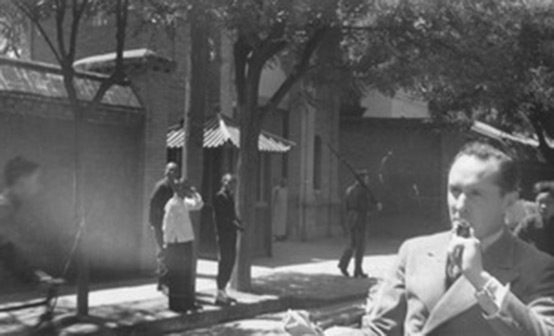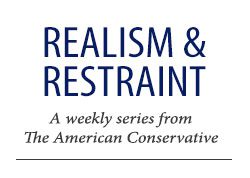John Paton Davies, Foreign-Policy Prophet

John Paton Davies’ memoir, China Hand, was posthumously published, to some critical acclaim, several years ago. His name is usually bracketed with other, more left-wing “defrocked diplomats” of the McCarthy period, including O. Edmund Clubb, Owen Lattimore, and John Stewart Service. The later lives of these folk are mostly remembered for lawsuits and lachrymose self-pity. Davies, however, after his service as a political adviser to General Stilwell and a member of the State Department Policy Planning Staff, turned his later life to more constructive uses. He removed himself and his large immediate family to Lima, Peru, where he engaged in the design and manufacture of furniture, winning several prizes. He also in his spare time wrote two books; one the posthumous memoir and the other a whimsical survey of American foreign relations, Foreign and Other Affairs, published in 1964. After a lapse of more than fifty years, the latter work reads very well indeed.
 It begins by noting two useful achievements of postwar foreign policy: a necessary rearmament resting on technology more than manpower, along with assistance for the revival of Western Europe and Japan. All the rest was what Davies called ”sleepwalking”: Kennedy’s Atlantic “Grand Design” and Latin American “Alliance for Progress,” Johnson’s wandering “through the sultry, sluggish villages of Southeast Asia … anxiously summoning the fatalistic to challenge their fate, to join battle with that which they did not know or, knowing, feared, did not care about, or even admired…. This moral militancy of the federal government bore little relation to realities at home or abroad.” In short, “we do not have the wisdom, temperament, discretion, or self-discipline to play around with other people’s social systems….the transition of a country from underdeveloped to developed is a growth process. This process in a social organism is even slower (perhaps three generations), no less complicated, and more painful than in a single human organism.”
It begins by noting two useful achievements of postwar foreign policy: a necessary rearmament resting on technology more than manpower, along with assistance for the revival of Western Europe and Japan. All the rest was what Davies called ”sleepwalking”: Kennedy’s Atlantic “Grand Design” and Latin American “Alliance for Progress,” Johnson’s wandering “through the sultry, sluggish villages of Southeast Asia … anxiously summoning the fatalistic to challenge their fate, to join battle with that which they did not know or, knowing, feared, did not care about, or even admired…. This moral militancy of the federal government bore little relation to realities at home or abroad.” In short, “we do not have the wisdom, temperament, discretion, or self-discipline to play around with other people’s social systems….the transition of a country from underdeveloped to developed is a growth process. This process in a social organism is even slower (perhaps three generations), no less complicated, and more painful than in a single human organism.”
“The nations of critical strategic importance to our security… have us blackmailed…. Aid to the rest of the underdeveloped world should, for the self-respect of all concerned, be phased out of the American government.” Davies’ chapter heading euphoniously asks the proper question: “Why Ouagadougou?”
In underdeveloped countries, Davies tells us, “A stern military regime that abridged the liberty of the citizenry but provided security for economic development is preferred over a lax civilian government permitting economic or political disorder…. the process of development through which these people are passing is deeply disruptive.”
As for strategic armaments, Davies prophesied that “the grisly absurdity of nuclear war re-popularizes conventional weapons … the hope is that everyone remembers that wars, after all, are fought for finite gains at finite costs.” He found hope in the avoidance of chemical warfare in World War II.
He was spot on in his prophecy about the Soviet Union: “The real threat to the Bolsheviks in the Kremlin is not imperialism in its last throes nor the heresies of fraternal parties nor the Russian masses who they have so abused but the new Soviet elite which they have nurtured—their own serpent-toothed sons.”
He was wrong only in his estimate of China, writing during the dislocations of the Mao period of “an underdeveloped country confronted by a staggering demographic versus resources dilemma… China hath not.”
As for Europe, he foresaw the present revival of nationalism. “[A]n acceptance of national diversity in the western half of the continent and its practical encouragement in the eastern portion are strategically sounder—and more workable because they are more in accord with the inclinations of the Europeans. With its enormous and versatile nuclear capacity, it is difficult to see why the United States needs a Western European contribution of the dimensions that we ask to deter Soviet attack.”
Davies decried the wreckage of the Foreign Service in the McCarthy-Dulles era, but reminded us that the East Asian experts had been driven out by Kennedy also:”in a rather novel transaction, some two hundred senior Foreign Service officers were brought into premature retirement in mid-1962, while there continued the politicization of the Department of State with pedagogues and politicians…. another, but genteel purge, this time from the liberal center. That the Foreign Service did not win the confidence of the New Frontiersmen is not surprising. Crusading activism touched with naivete seldom welcomes warnings of pitfalls and entanglements.”
The Middle East received little attention from him. He credited a UN force for providing a fig leaf over Israel’s attainment of most of its objectives, but underrated the power of oil: “The sheikdom of Kuwait has become a member of the U.N. If Kuwait, why not Sharja and the other Beau Geste sheikdoms of Trucial Oman, beside which Monaco, Andorra and Liechtenstein tower as models of statehood?”
But the crucial failing of our preoccupation today with the Middle East he understood quite well: “We fail to distinguish between hostile ideology associated with power, which is a real threat, and hostile ideology without significant power, which is impotent enmity.” Like George Kennan, he urged that “we be the ruler of our own spirit.”
His book contains memorable send-ups of some of the more absurd actors of the period, readily identifiable if not always named, including Chester Bowles, John Kenneth Galbraith, G. Mennen Williams, and William H. Orrick Jr. There is the fully identified but today forgotten Indian nationalist Vengalil Krishan Krishna Menon.
Of Orrick, Davies wrote that “he adapted to walking three miles to office, scorning elevators to bound up stairways and working for photographers in his galluses, sleeves rolled to biceps, collar unbuttoned, tie knotted at collar-bone and fist full of papers. But alas, poor Orrick, Justice knew him not well. His boss, whose concerns transcended Justice, relinquished his Civil assistant in 1962 to get State moving.”
Davies thought about foreign policy in the way that Americans should think about it—with both clarity and humor.
George Liebmann is a Baltimore lawyer and senior academic visitor at Wolfson College, Cambridge. He is the author of The Common Law Tradition: A Collective Portrait of Five Legal Scholars.
Comments